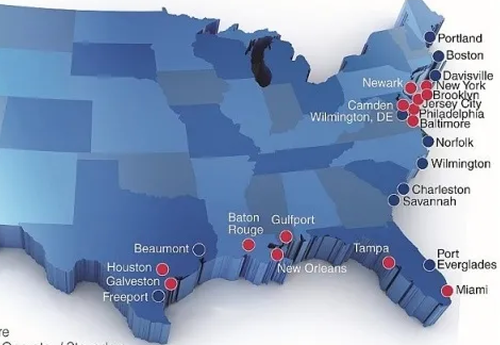Labor Talks At Major US East Coast & Gulf Coast Ports "Very Far Apart" As Potential Paralyzing Strike Looms
The US may be headed for a supply chain crisis this fall as a labor contract between the International Longshoremen's Association (ILA) and the United States Maritime Alliance (USMX) approaches expiration on Sept. 30. This could ignite strikes as soon as Oct. 1 across major ports along the US East Coast and Gulf Coast, instantly paralyzing complex supply chains ahead of the Christmas shopping season.
The ILA represents more than 45,000 dockworkers across the US at major ports. On Sunday, Executive Vice President Dennis Daggett addressed members in a Facebook post, indicating talks between the union and USMX are still far apart.
Here is Daggett's memo to union members:
Attention ILA Members,
I want to address the recent communication from USMX and make it clear—do not be fooled by this letter. We are indeed continuing to bargain in good faith to settle all local contracts, but the reality on the ground is far different from the picture they are trying to paint.
Employers like APM Mobile have been dragging their feet on resolving critical issues. One such issue is their use of Autogate in TIR Lanes, which we consider a clear violation of our Master Agreement. This isn't just happening in one location; many other ports are facing similar challenges in getting local management to agree on terms and conditions for local supplemental agreements.
On top of that, when it comes to the Master Contract negotiations, let me be frank—we are very far apart, particularly on the economic issues. In fact, we are at an impasse. The propaganda coming from USMX is just that—propaganda, likely the work of a PR firm trying to spin the situation in their favor.
Remember, unless you hear it directly from us, it's not the truth. Stay strong, stay united, and know that we are fighting every day for the fair contract that you deserve.
In Solidarity,
Harold and Dennis Daggett
ILA workers "operate multimillion-dollar pieces of equipment with precision, maintain them with the expertise of highly skilled technicians, and clerks who manage complex operating systems for gates, vessels, and yards," the union head said in a separate Facebook post from several days ago.
Daggett continued, "What I find particularly appalling is that while CEOs like those from CMA-CGM are taking home bonuses in the billions, ocean carriers continue to rake in skyrocketing profits by raising rates on their customers due to global conflicts or natural disruptions."
Bloomberg noted, "Daggett has repeatedly warned of a strike if no deal is reached by the deadline and last weekend set a meeting in early September for union delegates to discuss wage demands and strike strategies."
USMX released a statement late last week: "We are very far apart, particularly on the economic issues. In fact, we are at an impasse."
Major importers are paying close attention because any strikes at major ports on the East Coast and Gulf Coast ports will instantly spark significant delays in the delivery of goods and the return of the inflation monster that still haunts Fed head, Jerome Powell.
Logistics news site More Than Shipping outlined the widespread economic fallout that could occur if a strike materializes in the coming months:
Supply Chain Disruptions: A strike would cause significant delays in the delivery of goods, severely disrupting supply chains. This would particularly affect industries that rely on just-in-time inventory systems, such as retail and manufacturing.
Economic Losses: The East Coast ports handle a large portion of the nation's imports and exports. A strike could result in economic losses running into billions of dollars, impacting businesses that depend on these ports for importing raw materials and exporting finished products.
Retail and Consumer Goods: There could be delays and shortages in consumer goods, ranging from electronics to clothing and food items. Retailers might face empty shelves, leading to increased prices and reduced availability of products for consumers.
Automotive Industry: The automotive sector, which heavily relies on parts imported through these ports, could face production halts and delays in vehicle availability, affecting both manufacturers and consumers.
Agriculture: The export of agricultural products, including grains and produce, could be delayed, affecting farmers and exporters who rely on timely shipments to maintain market access and pricing.
Economic Ripple Effect: The strike's impact would ripple through the economy, affecting jobs not just at the ports but also in transportation, warehousing, and other related industries.
International Trade Relations: Supply chain disruptions could strain trade relationships with other countries, potentially leading to long-term consequences for US trade policy and agreements.
Shipping and Logistics: Shipping companies might need to reroute vessels to other ports, increasing transportation costs and times. This could lead to congestion at other ports and further complicate the logistics network.
Let's not forget that President Biden pledged to be "the most pro-union president in American history." Does the president still remember what he said a couple years ago?
